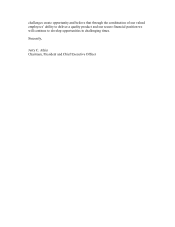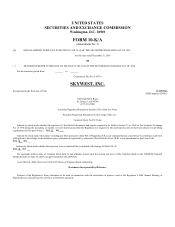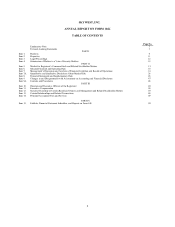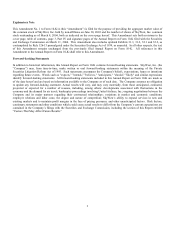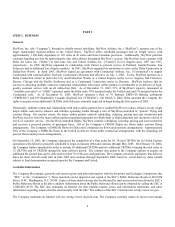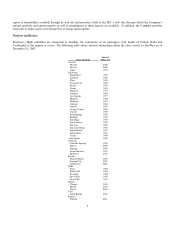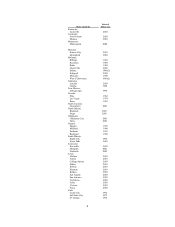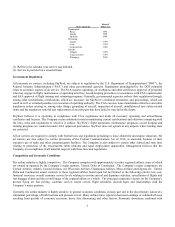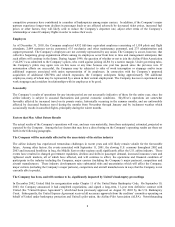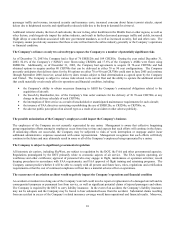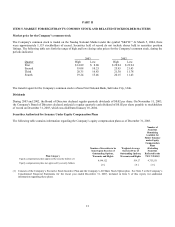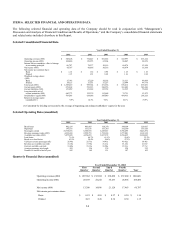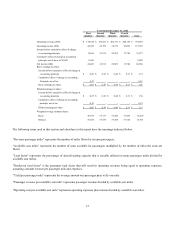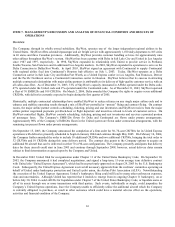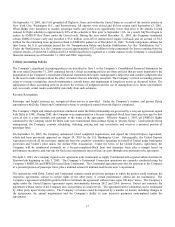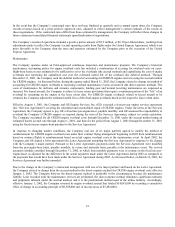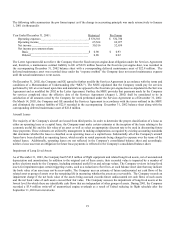SkyWest Airlines 2003 Annual Report Download - page 13
Download and view the complete annual report
Please find page 13 of the 2003 SkyWest Airlines annual report below. You can navigate through the pages in the report by either clicking on the pages listed below, or by using the keyword search tool below to find specific information within the annual report.passenger traffic and revenue, increased security and insurance costs, increased concerns about future terrorist attacks, airport
delays due to heightened security and significantly reduced yields due to the drop in demand for air travel.
Additional terrorist attacks, the fear of such attacks, the war in Iraq, other hostilities in the Middle East or other regions, as well as
other factors, could negatively impact the airline industry, and result in further decreased passenger traffic and yields, increased
flight delays or cancellations associated with new government mandates, as well as increased security, fuel and other costs. The
Company cannot provide any assurance that these events will not harm the airline industry generally or the Company’s operations
or financial condition.
The Company’s reliance on only two aircraft types exposes the Company to a number of potentially significant risks
As of December 31, 2003 the Company had a fleet of 76 EMB120s and 109 CRJ200s. During the year ended December 31,
2003, 82.4% of the Company’s (“ASMs”) were flown using CRJ200s and 17.6% of the Company’s ASMs were flown using
EMB120s. Additionally, as of December 31, 2003, the Company had agreements to acquire 30 70-seat CRJ700s and had
obtained options to acquire another 80 CRJ700s that can be delivered in either 70 or 90 seat configurations. The Company
presently anticipates that delivery dates for the 80 options on either 70 or 90 seat CRJ700s could start in June 2005 and continue
through September 2008; however, actual delivery dates remain subject to final determination as agreed upon by the Company
and United. The Company is subject to various risks related to its current fleet and the ability to operate the additional aircraft
that could materially or adversely affect its operations and financial condition, including:
• the Company’s ability to obtain necessary financing to fulfill the Company’s contractual obligations related to the
acquisition of aircraft;
• the breach by Bombardier, Inc. of the Company’s firm order contracts for the delivery of 30 70-seat CRJ700s or any
change in the delivery schedule of such CRJ700s;
• the interruption of fleet service as a result of unscheduled or unanticipated maintenance requirements for such aircraft;
• the issuance of FAA directives restricting or prohibiting the use of EMB120s, or CRJ200s, or CRJ700s; or,
• the adverse public perception of an aircraft type as a result of an accident or other adverse publicity.
The possible unionization of the Company’s employees could impact the Company’s business
The employees of the Company are not currently represented by any union. Management is aware that collective bargaining
group organization efforts among its employees occur from time to time and expects that such efforts will continue in the future.
If unionizing efforts are successful, the Company may be subjected to risks of work interruption or stoppage and/or incur
additional administrative expenses associated with union representation. Management recognizes that such efforts will likely
continue in the future and may ultimately result in some or all of the Company’s employees being represented by a union.
The Company is subject to significant governmental regulation
All interstate air carriers, including SkyWest, are subject to regulation by the DOT, the FAA and other governmental agencies.
Regulations promulgated by the DOT primarily relate to economic aspects of air service. The FAA requires operating, air
worthiness and other certificates; approval of personnel who may engage in flight, maintenance or operation activities; record
keeping procedures in accordance with FAA requirements; and FAA approval of flight training and retraining programs. The
Company cannot predict whether it will be able to comply with all present and future laws, rules, regulations and certification
requirements or that the cost of continued compliance will not have a material adverse effect on operations.
The occurrence of an aviation accident would negatively impact the Company’s operations and financial condition
An accident or incident involving one of the Company’s aircraft could involve repair or replacement of a damaged aircraft and its
consequential temporary or permanent loss from service, as well as significant potential claims of injured passengers and others.
The Company is required by the DOT to carry liability insurance. In the event of an accident, the Company’s liability insurance
may not be adequate and the Company may be forced to bear substantial losses from the accident. Substantial claims resulting
from an accident in excess of the Company’s related insurance coverage would harm operational and financial results. Moreover,
10


